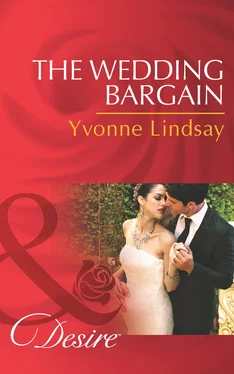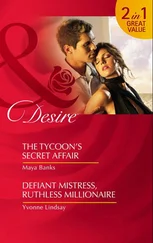In a weak moment she’d shared her worries with Burton, who’d immediately proposed marriage again, saying he’d planned to make her his wife all along and that the timing was perfect now, since as her husband, he’d be able to help her and her family. For starters, he’d insisted on taking over her parents’ mortgage and offering a financial settlement to relieve her and her parents’ stress when they married. She had honestly believed she could go through with it.
The reality, however, had been an unwelcome shock. Once she’d agreed to become his wife, Burton had shown himself to be intent on taking over much more than just her parents’ mortgage. The overwhelming sense of loss of self that had struck her when she’d been standing at the altar still lingered like cold, bony fingers plucking at her heart—at her mind. She closed her eyes briefly and shook her head to try and rid herself of the sensation.
When she opened them, Raif was looking at her again with those piercing blue eyes. She felt as if he looked right through her, but at the same time couldn’t see what twisted and tormented her inside. She wanted to break free of that gaze—to do something, anything, to keep herself busy, even if only for a couple minutes.
“I’ll make us some coffee, shall I?” she said, her voice artificially bright.
“Sure. Black for me.”
Of course his coffee would be black. Deceptively simple, like the man himself, yet with hidden depths and nuances at the same time. Shanal familiarized herself with the well-appointed kitchen, finding the coffeemaker and mugs tucked neatly away.
“How long have you known Mac?” she asked, determined to fill the silence that spread out between them.
“About five years.”
She waited for him to be more forthcoming, but may as well have been waiting for the polar caps to melt.
“How did you meet?” she persisted.
“We did some skydiving together, some canyoneering.”
Shanal was well aware of Raif’s interest in adventure sports. For a while it had seemed he was always hurling himself off some high peak or out some airplane, or kayaking down a wild river. The activities seemed a perfect match for the man he was—physical, daring and impulsive. But Raif’s interest in such activities had waned suddenly after the death of his girlfriend, Laurel, in a canyoneering accident a few years ago.
“Did he know Laurel?” Shanal blurted, without really thinking.
“She was his daughter.”
“Oh.” Her hands shook as she went to put her standard spoonful of sugar in her mug, and the white granules scattered over the kitchen counter. “I’m sorry. I didn’t mean to bring that up.”
“It’s okay,” he replied, his voice gruff. “I don’t mind talking about her.”
Shanal flicked him a glance, noted the way his hands had tightened on the wheel, his knuckles whitening. “That’s the hard thing about losing someone, isn’t it? People often don’t know what to say, so they say nothing at all.”
Raif grunted a noncommittal response. Shanal finished making the coffee, thinking about what she’d said. She’d discovered the same thing applied when people suffered other tragedies—like illness. No one really wanted to face the issue, and conversation usually skirted around things. At least that’s what she’d found with her father. As the motor neuron disease ravaged his body, piece by piece, he’d lost his independence and ability. Their friends, not knowing what to do or how to help, had slowly withdrawn.
It hadn’t helped that her dad was such a proud and private man. He’d hated being forced into retirement because of his illness—still hated every lost ability, every task that he could no longer complete on his own that forced him to depend on the care of others. He had always taken such pride in his independence, his abilities. His work as a surgeon had saved lives and allowed him to provide handsomely for his family in a way that gave him a sense of purpose and meaning. Losing all that had been devastating. He’d become reclusive, despising himself for his growing dependency on others.
And then there was the financial situation.
Shanal slammed the door on her thoughts before guilt could overwhelm her. She had, literally, run away from the answer to her parents’ financial problems. She didn’t want to go down that road right now. She just couldn’t. Maybe in a few days a solution would present itself to her—and maybe vines would one day grow grapes of solid gold, she thought, deriding herself.
She handed Raif his coffee and sat down beside him as he negotiated the boat up the river.
“How far do you plan to go today?”
“Not far,” he replied, before taking a sip. “The sun will be setting in a couple of hours. We can pick a spot along the river, tie off for the night and then make an early start tomorrow if you feel like it.”
“Sounds good to me.”
“Here,” he said. “Do you want to have a turn at the wheel?”
“Is that safe? I’ve never done this before.”
“Gotta start somewhere,” he replied. “Besides, we’re not doing more than seven kilometers an hour. I don’t think even you could get us into trouble at this speed.”
“You’re referring to the time I crashed one of the vineyard tractors into the side of a shed, aren’t you?”
His lips quirked.
“In my defense, no one told me where the brake was on that thing.”
“Point taken. Which brings us to your first lesson today.”
He briefly explained the controls in front of them and then let her take the wheel. Once she got the hang of it, Shanal found it surprisingly relaxing as she gently guided the boat along the river.
The sun was getting low in the sky, sending the last of its watery golden rays through the trees silhouetted on the riverbank, when Raif suggested they pull in at a tiny beach on the river’s edge. After they’d nosed in, and he’d set up the small gangplank, he went ashore to tie ropes to a couple of large tree stumps. Shanal shut down the motor, as instructed, and walked out onto the front deck.
“I know this is crazy,” she said. “But I feel as if we’re the only people on the river right now.”
“I know what you mean. You get a sense of isolation very quickly out here. It’s good in its way.”
“Thank you. I really did need this.”
He dipped his head in acknowledgment and went inside. After a few minutes she followed. Raif was opening a bottle of wine at the kitchen counter.
“Want some?” he asked, holding up an empty glass.
“Yes, please.”
She watched as he poured the white wine, and accepted the glass when he handed it to her.
“Yours?” she asked.
“Of course. My grapes, Ethan’s brilliance.”
She smiled. “You make a good pair.”
“Just like our dads did before us.”
“Is your dad still hands-on in the vineyard?”
Raif took a sip of the wine and made a sound of appreciation. “Yeah, although he’s pulling back more these days. He and Mum are planning a tour of Alsace and Bordeaux next year. He’s been tied to the vineyard for most of his adult life. It’ll be good for them to explore a bit more, and I know they’ll love France.”
Shanal took a sip of her wine, savoring the flavor as it burst over her tongue. “This is from the vineyard by your house, isn’t it? The one that partially survived the big fire?”
The Masters family had been devastated just over thirty years ago, when bush fires had destroyed the family residence, Masters Rise, and almost all their vineyards. It had taken years for them to recover. Years and many hours of hard work and determination from a family that had pulled together, growing closer and more unified in the face of the tragedy. Now, they were successful and strong again, but the ruins of the old house still stood sentinel over the family property—a solemn reminder that everything could be snatched away in the blink of an eye.
Читать дальше












